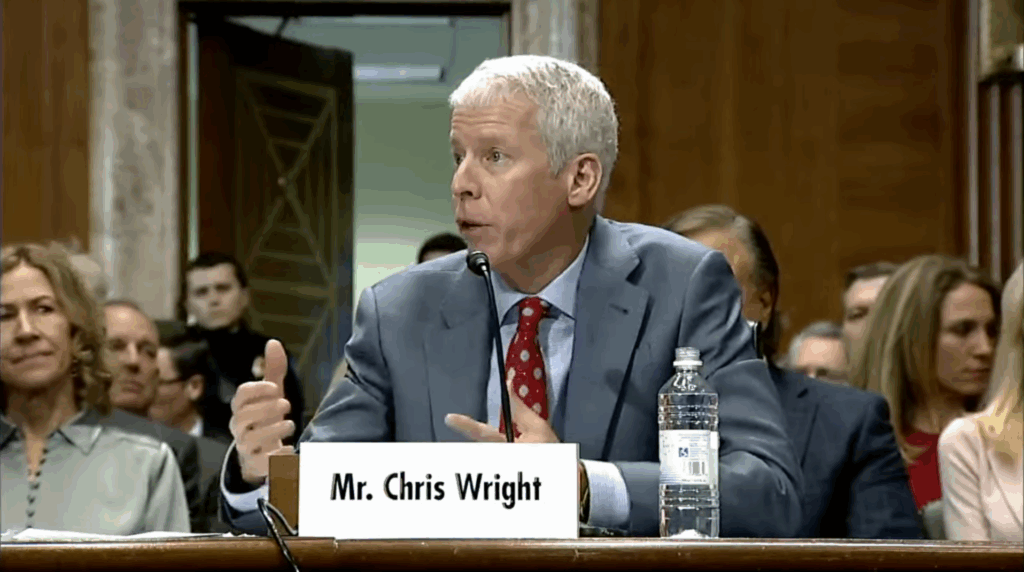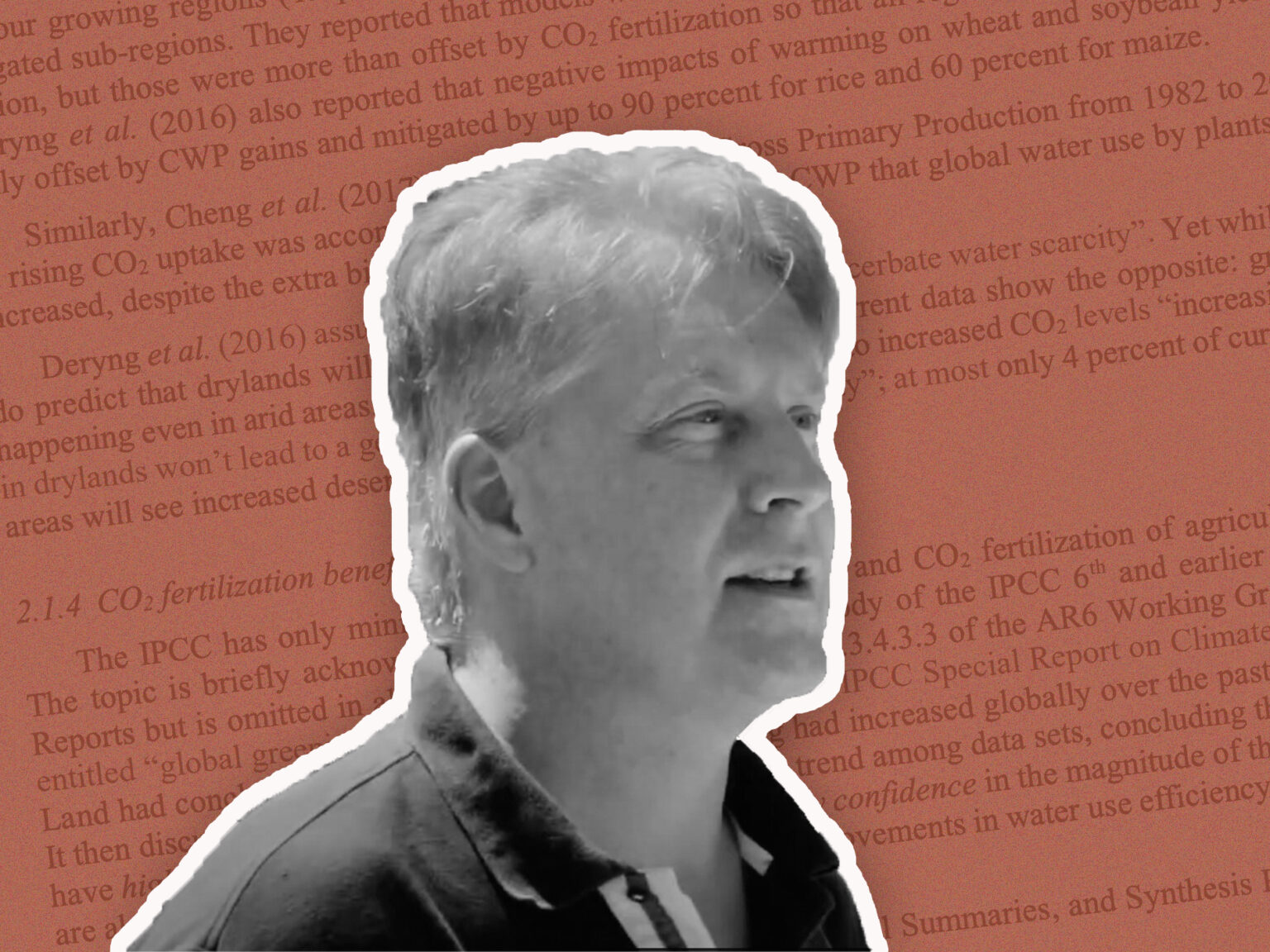This story is being published in collaboration with The Tyee, an award-winning independent media outlet based in BC.
A controversial report published this summer by the U.S. Department of Energy that alleges humans may not be the primary cause of climate change is being cited by the Donald Trump administration to abolish regulations on the oil and gas industry while being contested in federal court by environmental groups.
One of the report’s authors helped guide this assault on accepted climate science from Canada.
Ross McKitrick, an economics professor at the University of Guelph who regularly writes for the Vancouver-based Fraser Institute as well as the National Post, is one of five authors – and the only Canadian – who contributed to an official Trump administration study arguing that greenhouse gas emissions can be beneficial for humankind.
“I have written for years about topics in climate science and economics that tend to be overlooked or downplayed in assessment reports and policy discussions, to the detriment, in my view, of decision-making on energy and climate issues,” he wrote in an email in response to questions about his involvement.
“The invitation from the DoE to participate in writing the report was a good opportunity to elaborate on these themes and spark a broader discussion and debate,” he said.
Canadian climate scientists are stunned that McKitrick and the report’s other co-authors have been given such a huge U.S. government platform to spread fringe climate denial views to the public and decision-makers.
“I cannot state enough how insane it is that the same old debunked arguments from the same old debunked individuals are actually emerging in the year 2025,” said Simon Donner, a climate scientist and professor at the University of British Columbia.
Full of ‘cherry-picked statements’
Called “A Critical Review of Impacts of Greenhouse Gas Emissions on the U.S. Climate,” the report pulls together what scientists deem an “embarrassing collection of cherry-picked statements” that downplay the perils of human-caused climate change. The climate information website Carbon Brief identified more than 100 false or misleading claims in the report.
The 151-page document disputes the role that industries like oil and gas are playing in heating the atmosphere, alleging that “attribution of climate change or extreme weather events to human CO2 emissions is challenged by natural climate variability, data limitations, and inherent model deficiencies.”
It also spins some of the effects of a warming climate as positive – for instance, arguing that more carbon dioxide in the atmosphere will help plants grow. That statement has been routinely shown to be misleading because it leaves out the impact of droughts, wildfires, extreme heat, flooding and increased pests on agriculture. Yet the claim that greenhouse gases will somehow cause an agriculture-boosting “global greening” continues to be a popular talking point for right-wing politicians and influencers.
Throughout August, the DoE has asked for public comment on the report’s conclusions. That process will end in early September. “The public review phase allows our critics to bring their arguments forward and we will be revising our report after carefully considering the feedback,” McKitrick explained.

In an interview with the Washington Examiner, U.S. Secretary of Energy Chris Wright, a former fracking executive, acknowledged that errors in the report have been brought to his attention but didn’t mention specifics. “Look, the authors worked quickly to assemble a great amount of stuff,” Wright said. “Mistakes can be made, of course. And I have seen a few small mistakes identified. Of course, those will be fixed.”
McKitrick has frequently written posts for the Fraser Institute and newspaper columns that have urged policy makers to push back against people he calls “climate extremists” (those who think climate change is a crisis or an emergency situation requiring action to reduce greenhouse gas emissions). In 2023, he published a column disputing whether forest fire seasons in Canada are getting worse compared to historical data; that same year, 14.6 million hectares burned, the highest number recorded since 5.8 million hectares burned in 1996.
Donner said the fact that the Trump administration included a Canadian economist shows just how small the group of experts who deny the scientific consensus on climate change likely is.
“They [probably] couldn’t find five Americans,” he claimed. “They had to reach out to a Canadian.”
Green groups file legal challenge
The other authors of the report are Judith Curry, John Christy, Steve Koonin and Roy Spencer – a quartet of American scientists who have a long and documented history of attacking the mainstream scientific consensus that climate change is caused by humans and will result in disastrous global consequences without drastic cuts to greenhouse gases.
The team was assembled at the behest of Energy Secretary Wright, according to Travis Fisher, the director of energy policy at the libertarian think-tank Cato Institute, which was originally founded by oil and gas billionaire Charles Koch.
Fisher claimed that he and the other report authors agree that key scientific findings around climate change remain “unsettled,” a position that even he acknowledges could be viewed as climate denial.
“For those of us who can see that with our own eyes, we face the choice of rejecting what we know to be true or wearing the denier label,” he wrote in a post. “And because we cannot reject what we know to be true, we are reluctantly left with the latter.”
The Union of Concerned Scientists and the Environmental Defense Fund have now launched a lawsuit against the Trump administration. The two groups allege the report that McKitrick and the other authors produced are part of an effort by the DoE and the Environmental Protection Agency to “manufacture a basis to reject” the accepted science on human-caused climate change and its impacts.
“They have done so through a plan hatched and carried out in secret. In March 2025, shortly after being confirmed to office, Secretary of Energy Christopher Wright quietly arranged for five hand-picked skeptics of the effects of climate change to form a Climate Working Group,” the lawsuit alleges.
The New York Times reported that the DoE report was published just months after the Trump administration cut an effort hundreds of scientists were participating in. That group had been working to create a federal government analysis on how climate change is affecting the United States.
Long effort to undo greenhouse gas emission regulations
In the United States, regulations to limit greenhouse gases have been based on a 2009 finding from the Environmental Protection Agency that recognized carbon dioxide and five other greenhouse gases as pollutants. Called “the endangerment finding,” the determination is the foundation of the EPA’s legal authority – through the U.S. Clean Air Act – to limit greenhouse gases from a range of pollutants, from cars to power plants to oil and gas production.
For over a decade, industry and pro-business groups have sought to overturn the endangerment finding.
Now, the Trump administration is moving to do just that. The Environmental Protection Agency announced on July 29 that if the endangerment finding is rescinded, “the proposal would repeal all resulting greenhouse gas emissions regulations for motor vehicles and engines.”
According to the EPA, the move would also kill a federal government goal to boost the market share of electric vehicles to 50 per cent of all new vehicles sold in the U.S. by 2030.
When making the decision to roll back the endangerment finding, the Trump administration has cited the DoE report McKitrick and the other four authors worked on.
“The Endangerment Finding rulemaking was a separate undertaking. We were not involved in it and I haven’t read the EPA submission. I know they refer to our report in some places but from what I understand it mainly concerns legal, not scientific issues,” McKitrick said.
“In my opinion (for what it’s worth) the US Clean Air Act is not a good framework for greenhouse gas policies,” he added.
How the DoE report could affect Canadian policy
In Canada, there has also been an intense political effort to get rid of federal electric vehicles targets (the Canadian government has set the target at 100 per cent of all new light duty vehicle sales by 2035).
The Fraser Institute, the right-wing think tank that McKitrick regularly writes for, is now arguing that the Trump administration’s intention to roll back the endangerment finding means that the U.S. government will no longer be supporting electric vehicle adoption – so Canada should pull back as well.
Under leader Pierre Poilievre, the Conservatives are also now pushing to end the federal EV targets. Prior to the most recent federal election, Poilievre had made a promise to repeal the federal carbon tax (the tax had become so unpopular with voters that Liberal leader Mark Carney also promised to get rid of it).
Donner urged policy makers in Canada to look beyond the United States when it comes to the economic future of electric vehicles and renewable energy. While the Trump administration is going all-in on both the production and consumption of oil and gas, that’s not what’s happening in other parts of the world.
“If you look around the world and you look long-term at the accelerated shift to electric vehicles, the expansion of solar power, how cheap batteries have become, you see that there actually are tailwinds,” he said.
“And we just need to get past the craziness going on in the U.S.”
Subscribe to our newsletter
Stay up to date with DeSmog news and alerts






